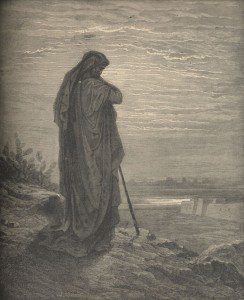As I mentioned in my last post, I’m starting a series called “Cut from the Sermon” (or, per my wife Anne’s suggestion, “Left on the Vestry Floor”), consisting of snippets that I had to cut from my sermons due to length or relevance considerations. Here’s the first one, from the sermon I preached on Sunday (part of a series on the book of Amos; you can find earlier sermons in the series here and here.)
This excerpt came in the sermon after the suggestion (at about 16 minutes in the sermon audio above) that our first reaction on seeing a beggar should be compassion and a desire to give, even if we then realise that a gift of cash might not be the best way to help:
We are called to care about that beggar, even if we have no direct way to help them. But if I care about every poor person I see – won’t that mean I am overwhelmed by the grief and the pain of the people around me? Yes. Welcome to the Lord’s world. The solution is not to ignore the pain; it is to acknowledge that we are only one person, that we cannot save everyone, and that God is in charge. But we should feel that pain. Turn to Amos 6 verse 3-6, which we read last week:
“3 Woe to you who put far off the day of doom, Who cause the seat of violence to come near; 4 Who lie on beds of ivory, Stretch out on your couches, Eat lambs from the flock And calves from the midst of the stall; 5 Who sing idly to the sound of stringed instruments, And invent for yourselves musical instruments like David; 6 Who drink wine from bowls, And anoint yourselves with the best ointments, But are not grieved for the affliction of Joseph.”
If you are not willing to experience the sorrow of others as your own sorrows – if you are not grieved for their affliction – then you are not loving. Yes, hand it over to the Lord, and trust in His providence, that He is caring for each one of His people. But do not simply shut yourself off to it.
One other thing that was not cut from the sermon, but which my wise wife pointed out to me afterward, was that I could’ve said more about what to do for that individual beggar, rather than for poor people generally. We talked about a few possibilities – smiling, offering them food, maybe even offering them money, talking to them – but the key thing was treating them as human. And that’s one of the big messages in Amos – the need to see all people as people, rather than objects. This is in fact the first offence listed in Amos’s condemnation of Israel: “Thus says Jehovah; For three transgressions of Israel, and for four, I will not turn back the punishment thereof; because they sold the just for silver, and the needy for a pair of shoes.” That image of selling the needy for a pair of shoes is particularly convicting even in a very literal sense, given the conditions in which shoes can be made today… In any case, I may try to fit this particular point about the need to see others as human into our final sermon on Amos, but the sermon is already twice as long as it should be, so that may end up on the vestry floor as well by the time this Sunday comes around.
Image: “The Prophet Amos” by Gustave Doré – Doré’s English Bible. Licensed under Public domain via Wikimedia Commons.













